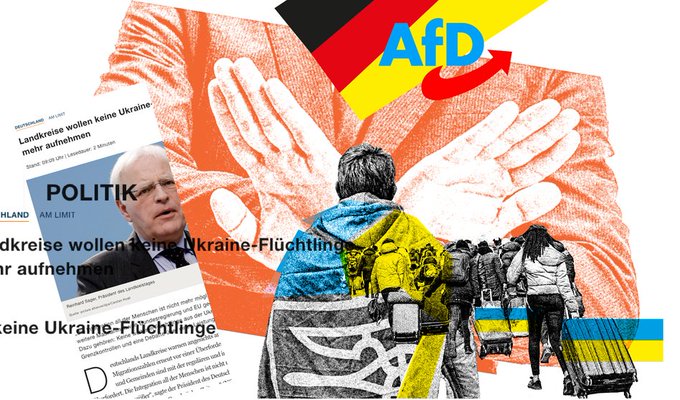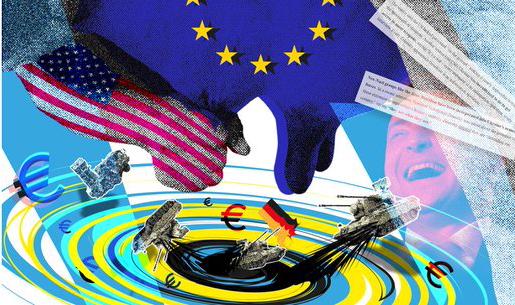See German-Language Doppelgänger posts from April 23 to May 03, 2024 and the Articles Shared by Doppelganger.
German content, which we attribute to the Doppelgänger Operation, encourages a deep skepticism toward governmental and international entities. The outlets often use exaggerated or speculative claims and amplify criticism against democratic leaders. Quotes and appeals to authority repeatedly cited Alternative for Germany (AfD) members, a party with an amiable view of Russia.
Content included a discussion of the allegedly growing popularity of AfD, harsh critiques of pandemic measures, and allegations of corruption and incompetence in Ukraine. In one instance, a Doppelgänger website “fact-checked” a Tagesschau article that stated Russian gas would not lower prices for German consumers. Posts and content also stoked fear and anxiety about social change and internal security, directing these concerns at immigrants, specifically.
Domains with German-language content include welt[.]pm, deutschlandkurier[.]de, rrn[.]media, faz[.]ltd, berliner-zeitung[.]de, spiegel[.]ltd, telepolis[.]de, deintelligenz[.]com, tichyseinblick[.]de, kaputteampel[.]com, sueddeutsche[.]de, wanderfalke[.]net, derleitstern[.]com, alexander-wallasch[.]de, grunehummel[.]com, sevimdagdelen[.]de, grenzezank[.]com, come-on[.]de, and nachdenkseiten[.]de.
Anti-Government Sentiments and Economic Pessimism
The content heavily criticizes Germany’s “Green” economic policies and the “traffic light coalition,” blaming them for a slowdown and underperformance against international peers.
Promoting AfD: An article in deutschlandkurier[.]de quoted Alice Weidel, a member of AfD, saying, “The irresponsible and self-destructive ‘energy transition’ and ‘transformation’ policy is the main cause of the continued decline of the German economy.”
Closure of Industrial Facilities: An article in RRN expressed cynicism about the closure of a facility and its timing in relation to new policies and American entrance into the market. “In a strange coincidence with green reform, heat pump manufacturer Grundfos is leaving Germany exactly a year after the Americans took over the market.”
Ukraine is to Blame: An article from faz[.]ltd attributed increases in the price of gas to Ukraine. The grim outlook portrayed by the faz[.]ltd article ends with an urge to elect members of parliament who will be able to “stand up for German interests.” Another article reframes the relationship between Russia and Germany with a quote from AfD member Hansjörg Müller:
“… with the whole sanctions regime and the war in Ukraine, this is once again a repeat of what the Anglo-Saxons have already done in two world wars; in both the first and second world wars, the ruling Anglo-Saxon political elections in financial circles. We have already sent Germany and Russia into wars against each other twice, from which only the Anglo-Saxons have benefited.”
Scapegoating and Revision of Government Actions During COVID-19
Content discussed Sarah Wagenknecht and her opposition to past COVID-19 measures, framing them as overreaches that need reassessment—the criticism aimed at closures and vaccine mandates, characterizing them as authoritarian.
Allegations of Inaction and Corruption in Ukraine
A recurrent theme questions the integrity and effectiveness of Ukrainian leadership, especially regarding foreign aid and military support, highlighting potential corruption. One article stated, “It is not entirely clear how Ukraine will end the already lost war and fight corruption when the president fears his own subordinates. So much so that he didn’t even hold presidential elections in the country.”
This antagonistic slant exists for most of the Ukraine-related content. Corruption claims appeared in welt[.]pm and spiegel[.]ltd, both attempting to pass as the legitimate news sites of Die Welt and Der Spiegel.
Ukrainian Human Rights Violations: Content in multiple languages has stressed the “dire” shortage of Ukrainian men in the Ukrainian armed forces. This theme was also present in the German content.
Dismissal of Ukrainian Competence: Articles often suggest that Ukrainian authorities cannot manage the country effectively without foreign intervention, raising concerns about sovereignty and national integrity, as seen in criticisms from a German investor.
Propagating Fear of Immigration
Impact of Immigration: Reports fuel concerns about the impact of continued immigration on German societal structures.
- One article discussed how German patience has run out for Ukrainians. This same article also discusses immigration more generally, attributing crime and attacks on German citizens to immigrants.
Highlighting NATO’s Alleged Failures and Agendas
Several pieces discuss NATO’s role, questioning its agenda and impact and portraying it as an aggressor. This narrative is evident in discussions about NATO’s responsibility for the War in Ukraine, pointing at the alliance rather than external threats.
- Incompetence of NATO: Multiple articles frame NATO as being fooled by Ukrainians, who the articles allege are selling weapons.
Internal Security Concerns and Surveillance
Articles raise alarms about the increased use of governmental surveillance technologies on civilians, comparing these actions to historical authoritarian surveillance practices. The articles point to increased hacking of citizens’ devices. This topic appeared multiple times earlier in April.
Tactics
Tactics and techniques appearing in the German-language content include selective reporting, emotional framing, conspiracy theorizing, and presenting false dichotomies. These behaviors can lead to dysfunction in public discourse.
Selective Reporting and Emotional Framing: Many articles selectively present facts that evoke emotions of betrayal, fear, or anger—targeting specific political figures or policies to shape public opinion.
Conspiracy Theorizing: Some commentary approaches or implies conspiratorial thinking, like suggestions of deliberate economic sabotage by foreign powers or manipulated public health policies.
False Dichotomies and Exaggeration: Issues are often presented in a binary manner without the nuance real-world situations usually demand, pushing the idea that one side is entirely right while the other is dangerously wrong.
Repurposing Real Concerns: Legitimate issues like immigration pressures and economic downturns are re-purposed to bolster broader narratives of governmental incompetence or malice.
Footnotes
Examples of tweets featuring this image: https://twitter.com/NLashonda30760/status/1784270286499512398, https://twitter.com/angelea36769/status/1784270574442643738, https://twitter.com/StarkishaN9107/status/1784270696358592641↩︎
Citation
@article{infoepi_lab2024,
author = {InfoEpi Lab},
publisher = {Information Epidemiology Lab},
title = {Pronouncing {Nonsense} in {German}},
journal = {InfoEpi Lab},
date = {2024-05-07},
url = {https://infoepi.org/posts/2024/05/08-german-doppelganger-may-2024.html},
langid = {en}
}

